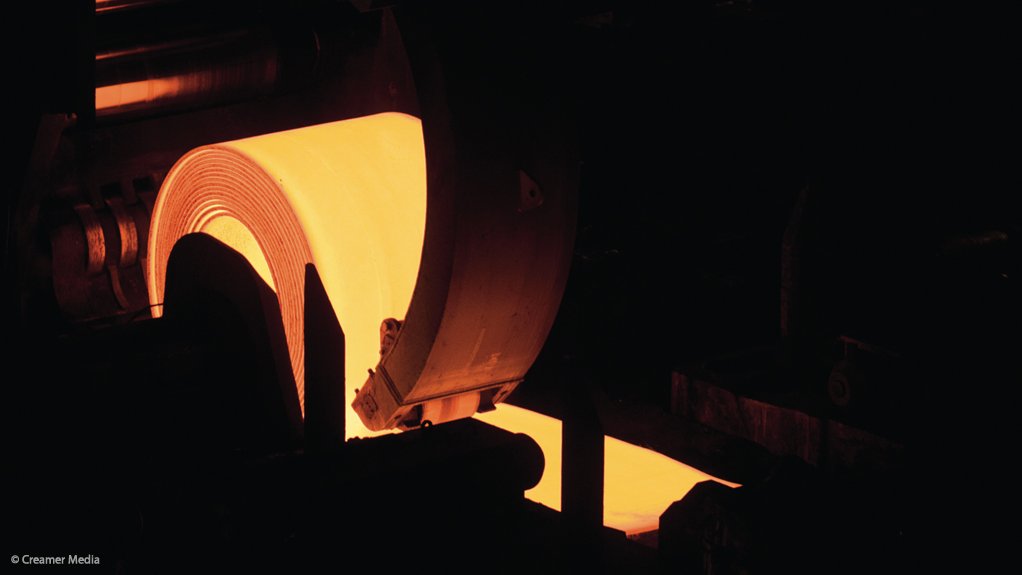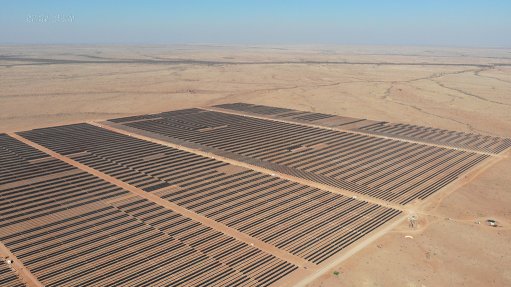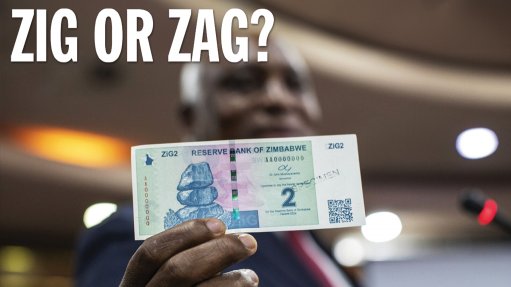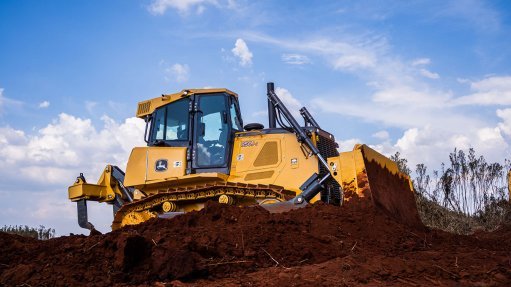EU carbon border tariffs could knock $16bn off Africa’s yearly GDP


On average, South Africa exports $1.4-billion a year of products from sectors covered by the EU's CBAM, including the iron and steel sector
Photo by Creamer Media
Concern is growing in South Africa and across Africa about the implications of the European Union’s (EU’s) decision to proceed with the implementation of a carbon border adjustment mechanism (CBAM) as a way of preventing so-called ‘carbon leakage’ by imposing a tariff on imports equivalent to the carbon prices being paid by European companies.
In terms of an agreement reached in December, the CBAM will be implemented later this year and will initially cover the carbon-intensive sectors of iron and steel, cement, fertilisers, aluminium, electricity and hydrogen, as well as some precursors and a limited number of downstream products.
While several details still need to be finalised, the imposition of a CBAM would have significant implications for South Africa, a new working paper produced for the Presidential Climate Commission (PCC) warns.
The paper shows that the EU imported, on average, $1.4-billion a year of products from sectors in South Africa covered by the CBAM, including the iron and steel sector which employs some 28 000 people currently.
The paper’s author, John Ward of Genesis Analytics, confirmed during a PCC webinar hosted to release the paper that the South African iron and steel sector was the most at risk to CBAM. However, the EU’s decision to include embedded and indirect emissions in the regulation held negative implications for chemicals and aluminium exports too.
While the CBAM was likely to face a legal challenge at the World Trade Organisation (WTO), Ward argued that South African policymakers needed to be more active in finding ways to address the consequences of an instrument that was “now firmly on the agenda” in the EU and was also being considered by other countries, including the US, Japan and Canada.
London School of Economics’ Professor Dave Luke warned during the same webinar that African countries were particularly exposed to the EU’s CBAM, owing to the fact that 26% of Africa’s trade was with the bloc, whereas only 2.2% of the EU’s trade was with Africa.
Quoting from yet to be published research commissioned by the Africa Climate Foundation, Luke warned that, at current carbon prices, the CBAM could have the effect of reducing Africa's exports to the EU by up to 5.7%, which would knock about 0.91% off the continent’s gross domestic product (GDP).
“That's equivalent to an about $16-billion reduction in GDP at 2021 levels,” Luke said.
The exact impact would depend, he stressed, on the price of carbon and the final coverage of the products, as well as the phase-in rate and whether the EU eliminates free allowances for European producers under its emissions trading system, or ETS.
“Africa is likely to be more severely affected because we are more exposed than most other countries or regions, such as China or India.
“This is due to the fact that production in Africa tends to be more carbon intensive – so it will suffer a greater competitiveness shock – and because there is a relatively higher proportion of exports going to the EU,” Luke explained.
University of Cape Town adjunct Professor Faizel Ismail, who previously served as South Africa’s ambassador to the WTO, questioned the legality of the CBAM, arguing that it appeared to violate a number of principles of the WTO, including Article 1, or the Most-Favoured-Nation principle.
Ismail added that the revenues raised would not support low-carbon transitions in developing countries, but “simply add to the arsenal of protective subsidies they are providing to European companies”.
He argued, too, that the CBAM should be viewed within a broader context of moves by blocs and countries, including the US and China, to bolster the competitiveness of their green industries.
Ismail urged developing countries to band together to oppose the CBAM and other protective measures being adopted and predicted that there would be a rise in litigation on green industry issues at the WTO, including between developed countries.
“We should be demanding that the EU, the US, China and others really engage at the multilateral level, as there needs to be greater coherence between the United Nations Framework Convention on Climate Change, the WTO and the G20 on finance and how we can collectively avoid ‘war games’ in the climate space or the green space and really begin to engage how we can cooperate to work together towards a lower-carbon and more sustainable world.”
Trade & Industrial Policy Strategies senior economist Gaylor Montmasson-Clair agreed that the EU CBAM was “deeply unjust” but warned that it was the “tree that hides the forest”, noting that the scheme had been under development for years and that several other large countries were considering similar interventions.
For this reason, South Africa should not be naïve in only pursuing a multilateral campaign against its implementation but should simultaneously prepare itself for the likelihood that measures similar to the CBAM will be implemented more broadly.
“I think we can pursue some legal avenues but that should not distract us from the priority, which is to decarbonise our economy and make sure that it is competitive going forward,” Montmasson-Clair stressed, while highlighting the growing uncompetitiveness associated with remaining such a carbon-intensive economy.
National Business Initiative’s Reitumetse Molotsoane called for greater policy coordination and cohesion on the issue to position South Africa “to respond nimbly and effectively” both to the threats and the opportunities associated with instruments such as CBAM.
She noted that the work done by business in response to calls for a just transition to a more climate-resilient economy and society had highlighted some of the opportunities associated with decarbonisation, including the potential to produce competitive green steel using green hydrogen.
“Key to this is obviously the renewables resources that we have in South Africa and how it feeds into the green hydrogen space, both of which are really important for looking at how we can decarbonise those key sectors, which are most vulnerable and most at risk from the effects of CBAM and similar initiatives from other countries,” Molotsoane said.
Comments
Press Office
Announcements
What's On
Subscribe to improve your user experience...
Option 1 (equivalent of R125 a month):
Receive a weekly copy of Creamer Media's Engineering News & Mining Weekly magazine
(print copy for those in South Africa and e-magazine for those outside of South Africa)
Receive daily email newsletters
Access to full search results
Access archive of magazine back copies
Access to Projects in Progress
Access to ONE Research Report of your choice in PDF format
Option 2 (equivalent of R375 a month):
All benefits from Option 1
PLUS
Access to Creamer Media's Research Channel Africa for ALL Research Reports, in PDF format, on various industrial and mining sectors
including Electricity; Water; Energy Transition; Hydrogen; Roads, Rail and Ports; Coal; Gold; Platinum; Battery Metals; etc.
Already a subscriber?
Forgotten your password?
Receive weekly copy of Creamer Media's Engineering News & Mining Weekly magazine (print copy for those in South Africa and e-magazine for those outside of South Africa)
➕
Recieve daily email newsletters
➕
Access to full search results
➕
Access archive of magazine back copies
➕
Access to Projects in Progress
➕
Access to ONE Research Report of your choice in PDF format
RESEARCH CHANNEL AFRICA
R4500 (equivalent of R375 a month)
SUBSCRIBEAll benefits from Option 1
➕
Access to Creamer Media's Research Channel Africa for ALL Research Reports on various industrial and mining sectors, in PDF format, including on:
Electricity
➕
Water
➕
Energy Transition
➕
Hydrogen
➕
Roads, Rail and Ports
➕
Coal
➕
Gold
➕
Platinum
➕
Battery Metals
➕
etc.
Receive all benefits from Option 1 or Option 2 delivered to numerous people at your company
➕
Multiple User names and Passwords for simultaneous log-ins
➕
Intranet integration access to all in your organisation



















